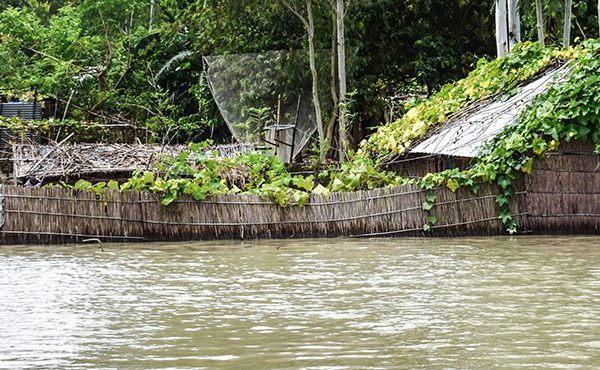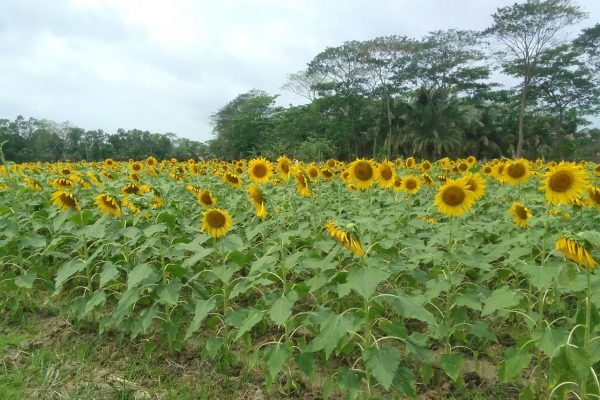Reading Time: 3 minutes
Donors are increasingly asking us what we are doing to advance the green transition. Here’s my answer.
BRAC runs large-scale development programmes in areas like health, education, microfinance, extreme poverty reduction and humanitarian relief, reaching over 100 million people in some of the world’s most climate-vulnerable countries. Our ecological footprint matters. Yet, this question misses the point of what BRAC’s most important role is. We are dedicated to fighting poverty. When it comes to climate action, our first priority is working with people living in poverty, supporting them to adapt to the climate crisis.
On the one hand, questions like this point to a positive shift – a long-delayed prioritisation of the climate crisis by the donor community. On the other hand, they bely a concerning trend: donors are starting to take their focus off of the goal to end extreme poverty, as signalled by the increasing usage of overseas development aid by wealthy countries to reduce emissions.
Donors who seek mitigation gains through poverty reduction activities are confusing priorities. People in poverty are not driving the climate crisis – a quick glance at the inequality of emissions makes that case clear. Even if we lifted all 700 million people out of extreme poverty, this would contribute to a less than 1% increase in global emissions. It is not the way in which we reduce poverty that needs urgent attention.

Women in the Ultra-Poor Graduation Programme in Mongla, southwestern Bangladesh, raising their hands after they were asked if they had ever lost their home in a storm. Photo credit: Courtney Calardo © BRAC, 2024.
The two agendas of ending poverty and advancing the green transition can be mutually reinforcing. There are ways to reduce poverty that will contribute to the green transition; and there are things we do to support the green transition that help to reduce poverty. Are these the actions that will reduce global carbon emissions and prevent environmental, social, and economic catastrophe? No.
One of the most important priorities for climate action is to achieve Sustainable Development Goal 1: Ending Extreme Poverty. Supporting people to lift themselves out of poverty enables people to withstand crises and make the choices they need to avoid catastrophe.
The Bhola cyclone that hit Bangladesh in 1970 was the deadliest tropical cyclone in recorded history. It was not the cyclone that killed up to half a million people in one storm, it was poverty. They died because they were poor.

Md Rashed Khan, an BRAC agricultural specialist, uses a handheld device to measure and advise farmers on salinity, acidity and mineral levels in the soil in Patuakhali in southwestern Bangladesh. This field is planted with sunflowers, which are more saline-tolerant than other crops in Bangladesh. Photo credit: Isabel Whisson © BRAC, 2024.
Reducing poverty inherently builds resilience, which has been demonstrated by the Graduation approach, developed by BRAC. Graduation is a sequenced approach that over a two-year period tackles multiple constraints and provides the ‘big push’ needed to create a long-term trajectory out of poverty. Households are equipped with a productive asset, support to meet basic needs, and intensive coaching to build agency, know-how, and hope. The most recent studies of the approach in Bangladesh and India show significant reductions in poverty, through a continued increase in income, consumption, assets, and food security, which persisted 7-10 years later.
Researchers from London School of Economics and BRAC University are mapping climate shocks against areas where the programme has been implemented across Bangladesh. The full results of the research will be out later this year, but initial analysis shows that women who have gone through the programme are better equipped to recover from flooding and drought events than households of the same levels of poverty that haven’t.
BRAC also gets asked how we are adapting our programmes now that ‘climate change is really happening’. The communities we work with have been experiencing the effects of climate change for many years. It is often suggested that development actors are ‘repackaging’ their development programmes in order to make them sound like climate adaptation, and resilience-building. Our experience with the Graduation approach demonstrates that traditional development is valuable climate action in itself.
Does that mean we aren’t changing our development programming in light of the climate crisis? Of course not. People are more vulnerable to climate impacts when they are in poverty, but now there are also millions of people who will fall back into poverty because they are vulnerable to climate impacts. We are working even harder to ensure our programming takes into account the evolving needs of the climate crisis.
We are adapting our Graduation programmes to do more in order to achieve similar gains to what they delivered before. We are finding ways for farmers to grow crops amidst extreme soil salinity; offering crop insurance to give farmers a lifeline when rain doesn’t deliver; and ensuring access to clean water so that women can avoid early hysterectomies. We know donors want proof that our adaptations are working – evidence takes time, but watch this space. You can be rest assured that we are working on that too.
The climate crisis should increase the urgency of ending poverty, not distract us from it. Lifting people out of poverty will enable households to increase their resilience to shocks, and provide them with the tools and choices to adapt in the long-term. We have solutions. We are learning and improving them to keep up with the changing climate. We need you to work with us to get these solutions to scale – the scale this crisis demands.
Isabel Whisson is Head of Policy Initiatives at BRAC and BRAC International





